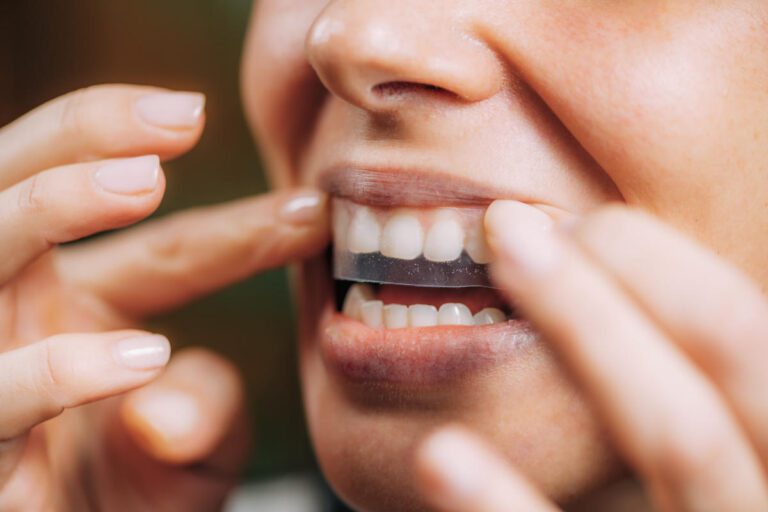British shoppers are being warned to stay away from “dangerous illegal cosmetic products” that are readily available to buy online.
Experts from the Chartered Trading Standards Institute (CTSI) have issued a strict warning on the products including home teeth whitening kits, gel nail kits and skin whitening creams.
In a new campaign to raise awareness about the dangers of such products, the agency has outlined the harmful ingredients and dangers of these popular products.
The warning reinforces previous cautions from professional bodies including the British Dental Association and the British Association of Dermatologists. Both organizations have previously spoken out about the health risk some of these products can pose.
According to the CTSI, some skin lightening products that can be purchased online may contain banned ingredients such as hydroquinone, mercury and approved drugs such as corticosteroids. Creams containing these ingredients are illegal to sell in the UK and Europe.
Illegal teeth whitening kits sold for home use may contain more than 0.1% hydrogen peroxide or other bleaching agents that release hydrogen peroxide. It is illegal for such kits to contain this volume of hydrogen peroxide, as it can cause burns and gum damage.
The agency said teeth whiteners bought from online markets “were found to contain illegal and dangerous levels of hydrogen peroxide, up to 300 times the safe, legal limit.”
It comes after a number of home teeth whitening kits sold on retailers including AliExpress, Amazon, eBay and Wish were found to contain alarmingly high levels of hydrogen peroxide.
The Which? research, published in 2021, found that 21 of 36 teeth whiteners tested from online purchases contained more than the legal amount of hydrogen peroxide allowed for home use in such kits.
Paul Woodhouse, Board Member of the British Dental Association, he said then: “Hydrogen peroxide is a seriously powerful chemical and should not be mixed.
“Dentists are trained to use it and also know which whitening products are effective to use and safe for teeth and gums. If you damage your gum tissue, you’re never going to get it back and you’re going to lose your teeth.
“If it penetrates the surface of your tooth, which is possible, it will probably lead to the death of that tooth.”
Regarding gel nail polish kits, CTSI warned that certain chemicals in these nail treatments and systems can cause allergies in some people, resulting in skin damage and lifelong side effects.
UV Gel nail treatments and liquid monomer and polymer powder (L&P) nail systems contain chemicals known as acrylates, including HEMA (2-hydroxyethyl methacrylate) and Di-HEMA (trimethylhexyl dicarbamate).
“To reduce the risk of developing an allergy, UV Gel nail treatments should not come into contact with the skin, so they should only be administered by trained salon professionals using appropriate lamps,” CTSI says.
The British Association of Dermatologists (BAD) first issued warnings about allergic reactions linked to artificial nails in 2018 after several people reported skin reactions.
The agency acknowledged that the closure of nail salons during the Covid pandemic may have contributed to more people experimenting with gel kits at home – however, the risk of allergies has increased due to the lack of experience non-professionals have with these products .
BAD’s Dr Deidre Buckley said: “Many people are unaware of potential medical and dental effects if they become sensitized to methacrylate nails. The same or very similar methacrylates are used in white tooth fillings, tooth enamel, orthopedic bone cement, diabetic glucose sensors and insulin pumps. This may have serious implications for future medical care.”
CTSI said its officers are “working hard to intercept these dangerous products at UK ports and borders”, adding that 88% of cosmetics checked last year by just one of its teams in Suffolk were found that they were not safe or not. compliant.
Christine Heemskerk, chief product safety officer at CTSI, said in a statement: “Cosmetics should attract compliments, not complications. These dangerous products can cause the public serious and lifelong side effects.
“Trading Standards will remove these products from sale and take action where necessary, but online sellers must take responsibility for the products available for sale on their websites. Turning a blind eye is not an option when we’re in the business of people’s health. Online shopping can and should do better.”
Dr Emma Meredith, chief executive of the Cosmetic, Toiletry and Perfumery Association (CTPA), added: “The safety of our customers is the cosmetics industry’s number one priority and the UK has strict laws dedicated to the safety of cosmetic products and ingredients their.
“All cosmetic products legally available on the UK market, including online, must comply with these strict rules. The CTPA will advise you to buy your cosmetics from a reputable retail source and ensure they are properly labeled with full ingredient list.
“If a product is labeled ‘for professional use only’, only trust a professional to apply it for you to get the results you want, safely.”
Buyers are encouraged to report any suspicious cosmetic products or if they have experienced adverse reactions after using a product to Trading Standards. You can call the free Citizens Advice Consumer Helpline on 0808 223 1133 if you are in England or Wales. In Scotland contact Consumer Advice Scotland on 0808 164 6000 or if you are in Northern Ireland call Consumerline on 0300 123 6262.
Watch: Dermatologists warn against gel nail kits after allergies rise
Read more about health and safety:


